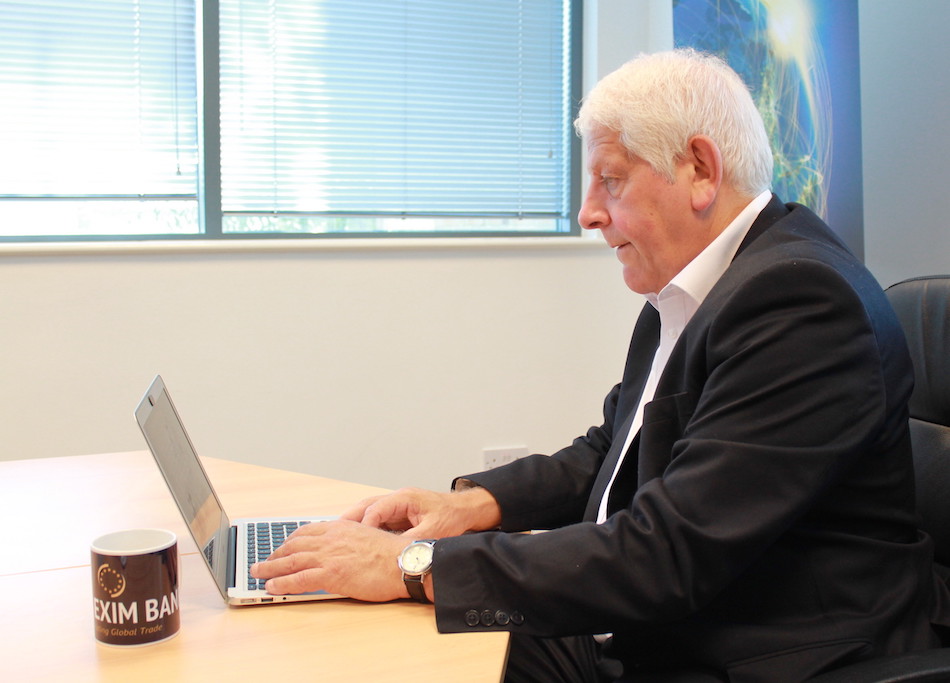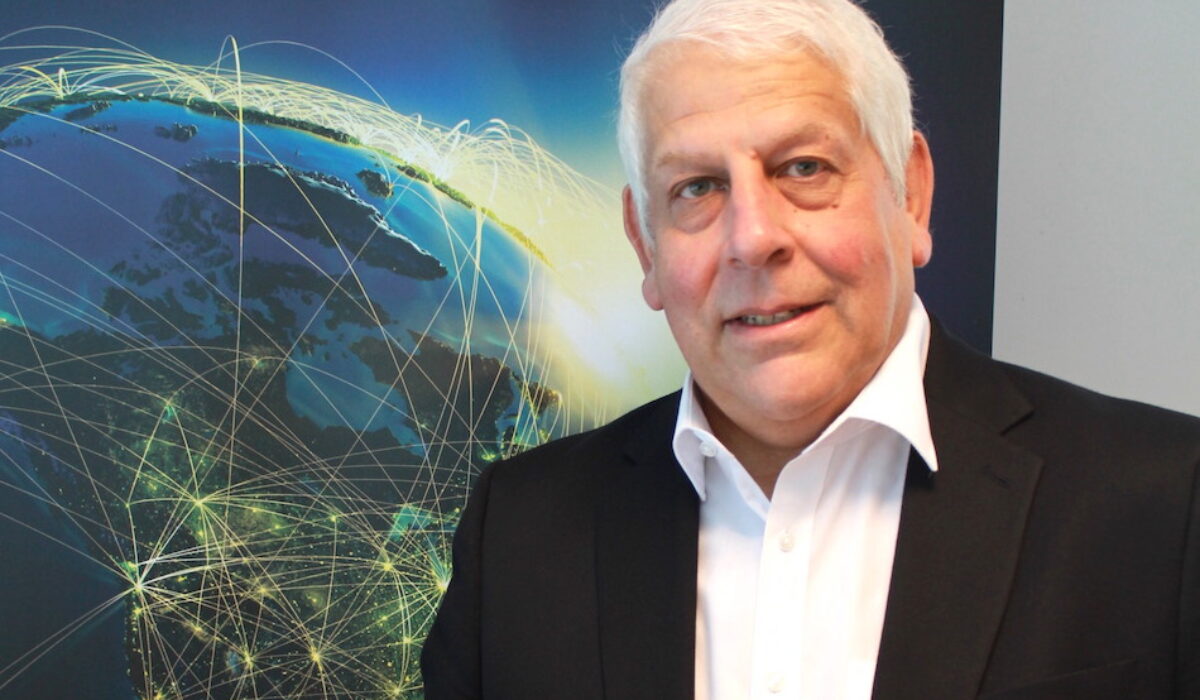Trade Up
We talk pandemics, trade finance and the potential Euro Exim bank can offer with Graham Bright
Head – Compliance and Operations
CEO Insight: Trade finance is at the core of Euro Exim Banks (EEB) portfolio of products and services. Last year was full of possibilities, with speed, reliability and security at the core of the banks trade finance offering. However, the Covid-19 pandemic has had far reaching consequences, altering the goods consumers want, the goods they need and what defines luxuries and necessities. How has this impacted what your customers want and what solutions you can offer?
Graham Bright: Covid-19 has decimated some business, but has also presented many opportunities for companies, as international trade continues, even with difficulties obtaining finance and currency. At EEB, we are seeing an increase in the amount of proposed business in our target markets as many of the larger banks are not currently able to support smaller corporates. With a diverse team geographically, currently represented in 24 countries, we have seen an explosion of interest, traffic and proposals coming our way as we offer very competitive rates, a unique, trusted service with gearing for repeat business.
Where competitors are retracting, we have increased our headcount in our international offices. At the beginning of 2020 in Chennai, India, our affiliate office had 50 people. Now we employ 150 people there, at a time where Covid-19 uncertainty and cost cutting generally has meant major banks laying off significant number of staff.
Large corporate offices housing thousands of employees will not be the working environments of the future. Working from home is becoming the norm. Even for financial companies, despite possible security issues, banks are moving from traditional bricks and mortar to more virtual presence. This is also freeing up very experienced people with significant contacts who can work with EEB on an independent basis in our role of principle provider of trade services, all for the benefit of our growing customer base.
“The rates that EEB offer, alongside its speed of service and trust engendered with our clients sets us apart.”
CEO Insight: Headquartered in St Lucia with a rep office in London, EEB is globally recognised and received the 2018 and the 2019 Best Global Trade Services Bank Award, not least because of its long term relationships with clients. What distinguishes EEB from its competitors in the market?
GB: The rates that EEB offer, alongside its speed of service and trust engendered with our clients sets us apart. We have experienced staff in all locations, and we provide services to low volume clients that major banks find too costly or time consuming to cover. EEB does a lot of work in China, Africa and South America, which are often challenging and in which major banks often wish to operate. Many are closing offices rather than expanding in these areas as the costs of maintaining infrastructure for limited business are so huge.
Many Tier 1 banks are going through extreme conditions, with fines for financial irregularity, heavily reduced revenue and profits and cost cutting plans being regularly publicised. EEB offers specialised roles in these regions, reaching smaller companies where larger banks no longer wish to participate.
EEB has local staff in Africa, growing a team in Europe and heavily building sales resources in the Indian community. There are 1.4 billion people in India, links in to the UAE and trade agreements operating. EEB is actively applying for RBI approval, which will increase EEBs expertise and trust in the local markets, further expand our international presence and enhance our reputation as thought leaders and experts in our sector.

CEO Insight: With limited industries avoiding restructuring or exclusion, how does EEB plan to respond to the challenges organisations face in the current economic landscape? As a facilitator of global trade how can EEB aid firms in these uncertain times to continue successful trade after Covid-19?
GB: EEB works with small to medium sized corporates who have traditionally been held back due to access to currency. Even more apparent during this pandemic has been the uncertainty in markets where banks have tightened financing and restricted loans and other forms of supply chain finance. If a company in Africa wants to deal with foreign currency like US dollars, it can be very expensive. For 90 to 360 day trades it is not an uncommon demand from financing banks for companies to maintain 110% of the trade value in an escrow account for the whole time of that trade.
This clearly affects the cash flow of small companies irreparably, stifling the opportunity to trade in multiple deals internationally. Major banks will not take on this risk. To help such companies, EEB finds an appropriate level of collateral when working with these companies, enabling them to trade effectively, repeatedly and safely. Companies pay fees at a competitive rate and settle when all the papers (i.e. Bills of Lading) are in order.
As an added insurance, EEB is the consignee of the goods until the end of the transaction, at which point ownership title is transferred. This allows smaller companies to trade during challenging times as seen with Covid-19 and thereafter, without tying up all important cash flow and allowing them to maintain their businesses and even to grow at this unprecedented time.
CEO Insight: EEB have partnered with Ripple; a blockchain based financial settlement system that is reliable, secure, cost efficient and fast, strengthening its compliance process and ramping-up speed and efficiency. Can you explain to CEO Insight readers how this partnership benefits your customers?
GB: EEB has partnered with RippleNet for its real time payment and liquidity capabilities. The underlying framework of the service is built on the new standard industry norm of a secure distributed ledger technology, using blockchain for immutability, transparency, speed and immediacy of information flow.
Apart from its network services, Ripple is also the custodian of its own cryptocurrency named XRP, securing the transaction from one player to another. Whilst it is not possible to mine XRP, as one can with Bitcoin, it provides more stability and is internationally recognised as one of the top digital assets.
For international customers, the Ripple system enable them to pay anywhere in real time, unlike SWIFT instructions which may take a number of days to process. EEB offers a real time audit trail completed when a payment physically moves from one user to another user, without the use of correspondent banks. It offers a seamless, frictionless way of transferring money, providing an immutable, transparent way of seeing everything in the trade process.
The xCurrent part of the Ripple offering deals with payments directly and the service also offers On-Demand Liquidity (ODL). This allows payment to be made in the local currency and allows the buyer to receive the money in its local currency without moving into US dollars at high cost.
The system exchanges the local currency into XRP cryptocurrency, transfers it physically across the border and at the other end transfers it into local currency at a set rate without fluctuation, with a standardised approach to get from one local currency to another. EEB was one of the first banks as a regulated institution to use this service, and recognised by Ripple internationally for the work we have done.
“EEB works with small to medium sized corporates who have traditionally been held back due to access to currency.”
CEO Insight: Regarding new technologies, what can we expect to see from EEB in the future? What will the trade finance landscape look like in the next few years and what are the main factors that will assist the future of trade?
GB: The trade process can be very complex. From the beginning EEB has invested in technology and created its own trading platforms. Trade transactions have up to 100 fields of critical information including buyers, sellers, banks, ports, importers, insurers, inspectors, shippers and a complete description of goods.
EEB has automated this process as much as possible, including AML checks and indemnity documents etc. We gather all the documents and with innovative workflow, follow the complete trade lifecycle, supported by blockchain and AI, which are becoming increasingly important for all trade participants.
Currently, when any company deals with small corporates, for example in Africa who want to buy from another small corporate in Singapore, blockchain means nothing to them. Companies want their trade done at the right price at the right time. EEB has invested to make sure the applications are blockchain and future ready, but despite all the hype, no customers have directly if their trades are supported by these technologies. The true benefit to the customer will come when a commercial problem occurs and you are able to resolve it very quickly, keeping costs down.
Regarding technology, EEB is future ready and we can pass on that benefit to our customers, and is focused on the cost and refinement of the system as new technologies are implemented. Many businesses were traditionally based on and driven by cheap goods coming from China. Since Covid- 19, trust and availability have come centre stage and China’s pre-eminent supplier position is under threat.
Looking for new markets and sources of supply, there has been increased attention on Africa for raw materials, IT resourced and technological excellence centres With free trade agreements facilitating easier movement of goods across borders we should see many more FTAs, with new zones being created and cheaper routes for goods to move
CEO Insight: FTAs are designed to reduce or eliminate certain barriers to trade and investment and to facilitate stronger trade and commercial ties between participating countries. As threats of a renewed trade war between the US and China loom, what impact will this have on global trade and can EEB offer any solutions?
GB: African trade agreements are continually evolving and growing, and a bigger threat is emerging for African nations. As demand for new infrastructure across the continent is growing, China has been the main provider of road, rail, ports and airports, specifically building a commercial and military foothold along the East Africa coast. Where countries encouraged investment from China, so China has taken space and ownership of the ports, and have created manufacturing capabilities in those areas.
This is not good news for local business, and now locally produced Chinese goods are infiltrating the market, not adding to people, goods, services and productivity in emerging economies. The world is looking very much at the next steps China takes and how far its foreign influence may affect the continent. There are issues around movement of goods, and with over 400 FTA’s globally, nations should participate wherever possible to preserve and expand their ability to compete in all international markets.
CEO Insight: EEBs global reputation and popularity have seen it expand into Africa, Asia and India. Do you have any future expansion plans? What can we expect from EEB in the coming years?
GB: EEB has found the sweet spot in the market, dealing with SMEs and corporates across a number of industry sectors. We look at each proposed transaction on a case by case basis, taking into account both local and international knowledge, legality, regulation and compliance. As a company, EEB is continually growing, with an increased focus on the Indian and UAE offices and more resources to meet the demand s of a challenging African continent. We are in it for the long term, a real voice in the industry, supporting charities both locally and internationally.
I am a key speaker at a virtual conference for the African and Asian regions in September, where we will be discussing new regulations, compliance, challenges and opportunities. As with all organisations, banks of all sizes are being put under huge pressure to make sure they fulfil their regulatory compliance obligations.
We are proud that EEB exercises strong due diligence, full compliance and operational excellence in all our activities and processes.
For more information www.euroeximbank.com

